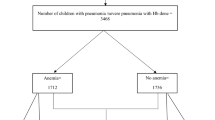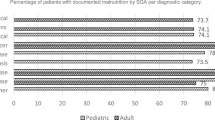Abstract
Objective: To determine the prevalence and analyse the characteristics and causes of malnutrition among inpatients in an HIV highly endemic area.
Design: Prospective cross-sectional study.
Setting: Department of Internal Medicine, University Hospital, Bujumbura, Burundi.
Subjects: 226 adult inpatients.
Main outcomes measures: Evaluation of nutritional status using anthropometry. Degree of malnutrition defined by the percentage of body weight loss (BWL), calculated by reference to the usual body weight.
Results: Among the 226 patients recruited (mean age: 34.4±11.9 y, M:F sex ratio: 1.72), 102 (45.1%) were HIV seropositive. 62 (60.8%) of these HIV seropositive were AIDS cases. The AIDS defining criterion was ‘wasting syndrome’ for 25 (40.3%) and opportunistic infection (OI) for 37 (59.7%) including 34 cases of tuberculosis (TB). The nutritional status of 119/226 patients (52.7%) was normal (BWL≤10%). Moderate malnutrition (10%≤BWL≤20%) was observed in 47 (20.8%) and severe malnutrition (BWL>20%) was observed in 60 (26.5%). HIV seroprevalence and, among HIV seropositive subjects, the percentage of AIDS cases increased according to decreasing level of nutrition (Chi2 for trends: P<0.001 in both instances). The fat free mass mass of malnourished subjects was lower and the fat body mass was higher among HIV seropositive subjects than HIV seronegative subjects. Among HIV seropositive subjects, malnutrition was associated with TB (P<0.001) and dysphagia (P<0.05). Among HIV seronegative subjects, malnutrition was associated with decreased food availability (P<0.003) and TB (P<0.05). One week after admission, the mortality rate was higher among HIV seropositive subjects (10.8%) than seronegative subjects (2.4%, P=0.009). Other factors associated with death were decreased fat free mass (P<0.01) and tricipital skinfold thickness (P<0.04).
Conclusions: The prevalence of malnutrition is high among the inpatients investigated. Main factors are HIV infection and TB. Strategies adapted to the African context should be developed to prevent, detect and treat malnutrition and associated factors, particularly among HIV seropositive subjects.
Sponsorship: This study was sponsored by grants from Agence Nationale de Recherche sur le SIDA, Ministère Français de la Coopération, France and University of Burundi.
This is a preview of subscription content, access via your institution
Access options
Subscribe to this journal
Receive 12 print issues and online access
$259.00 per year
only $21.58 per issue
Buy this article
- Purchase on Springer Link
- Instant access to full article PDF
Prices may be subject to local taxes which are calculated during checkout
Similar content being viewed by others
Author information
Authors and Affiliations
Contributions
Contributorship: Théodore Niyongavo, a PHD student, was involved in each step of the study from its conception to the data analysis and development of the article; Daniel Henzel performed the statistical analysis; Jésus Marie Ndayishimyie, Emmanuel Nikoyagize and Athanase Ndayiragije recruited the patients included in the study and performed the clinical examinations; Jean Claude Melchior, a specialist in clinical nutrition, acted as a consultant during the consecutive steps of the study; Bernard Larouze, senior scientists, were in charge of the entire process from developing the concepts of the study to writing the article.
Corresponding author
Rights and permissions
About this article
Cite this article
Niyongabo, T., Henzel, D., Ndayishimyie, J. et al. Nutritional status of adult inpatients in Bujumbura, Burundi (impact of HIV infection). Eur J Clin Nutr 53, 579–582 (1999). https://doi.org/10.1038/sj.ejcn.1600789
Received:
Revised:
Accepted:
Published:
Issue Date:
DOI: https://doi.org/10.1038/sj.ejcn.1600789
Keywords
This article is cited by
-
High prevalence, low identification and screening tools of hospital malnutrition in critically- ill patients in Malawi
European Journal of Clinical Nutrition (2022)
-
Effect of Human Immunodeficiency Virus on Trace Elements in the Brain
Biological Trace Element Research (2021)
-
Understanding the association between caregiver sex and HIV infection among orphans and vulnerable children in Tanzania: learning from the USAID Kizazi Kipya project
BMC Health Services Research (2020)
-
Malnutrition in patients admitted to the medical wards of the Douala General Hospital: a cross-sectional study
BMC Research Notes (2017)
-
Causal impact of malnutrition on mortality among adults hospitalized for medical illness in sub-Saharan Africa: what is the role of severe sepsis?
BMC Nutrition (2015)



